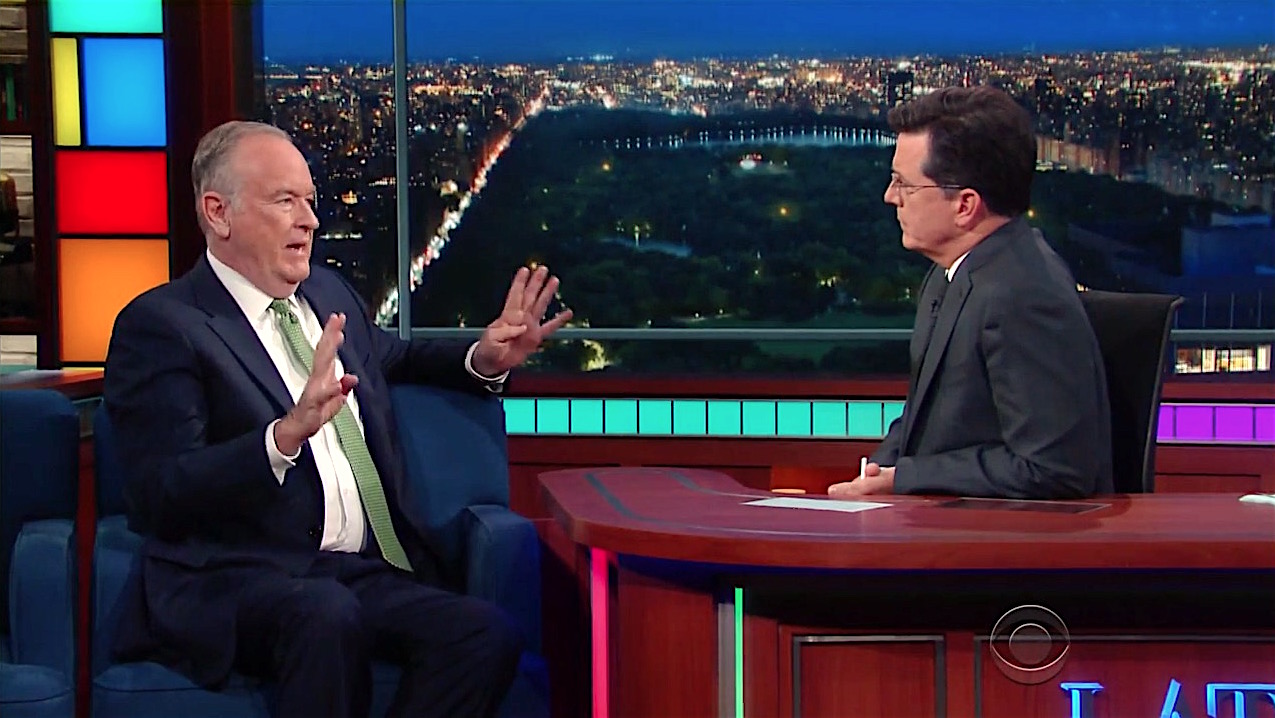Bill O'Reilly tells Stephen Colbert all U.S. gun crimes should be federal crimes


A free daily email with the biggest news stories of the day – and the best features from TheWeek.com
You are now subscribed
Your newsletter sign-up was successful
Stephen Colbert scheduled Bill O'Reilly as a guest more than a month ago, but since he was on Monday's Late Show, the two TV hosts started with the mass shooting in Orlando, Florida. Colbert asked O'Reilly how he would respond if he were president, and a very loose and expansive O'Reilly said Orlando wasn't a "tragedy," but a battle in a larger war against Islamic jihadis. They don't represent all of Islam, he said, "but there's enough of them to cause the world pain on a consistent basis. So that's the problem." Colbert noted there's a different way to frame the problem, and the conversation shifted to guns and gun regulation.
O'Reilly wasn't buying Colbert's frame. "It's my job as a news analyst to find a solution to the problem, and the solution is not some kind of federal gun control at a level of taking guns away," he said, earning angry murmurs from the audience and a request for silence from Colbert. O'Reilly pointed to gun violence in Chicago, then provided his own counterexample, Australia, finally arguing that gun violence has also dropped sharply in the U.S. since the mid-1990s, because the U.S. locked up "violent offenders, including drug gangsters."
"My solution to the gun problem is this," O'Reilly said. "No. 1: Congress debates which guns are allowed ... It's perfectly legitimate for Congress then to say, 'What kind of rifles should people be able to buy?'" Colbert clarified that a President O'Reilly would be fine with banning assault weapons (he would), then tried to get back to ISIS. "One more point on the guns, because your crew out here is applauding stuff they shouldn't be applauding," O'Reilly said. "What we need to do here is, every crime — every single crime committed with a gun in this country, whether it's Orlando terrorism or whether it's Chicago and the inner-city drug gangs — every crime is then a federal crime," with tough mandatory minimum sentences.
The Week
Escape your echo chamber. Get the facts behind the news, plus analysis from multiple perspectives.

Sign up for The Week's Free Newsletters
From our morning news briefing to a weekly Good News Newsletter, get the best of The Week delivered directly to your inbox.
From our morning news briefing to a weekly Good News Newsletter, get the best of The Week delivered directly to your inbox.
In the second half of the interview, O'Reilly explained why he thinks President Obama and Congress should "declare war on the Islamic jihad." Colbert, preternaturally polite through the entire interview, asked when the war against jihad would be over. "The war is over when the level of terrorism goes down, the refugees can return home [to Syria], and you have a basic handle on the situation," O'Reilly said. It's quite a performance. Watch below. Peter Weber
A free daily email with the biggest news stories of the day – and the best features from TheWeek.com
Peter has worked as a news and culture writer and editor at The Week since the site's launch in 2008. He covers politics, world affairs, religion and cultural currents. His journalism career began as a copy editor at a financial newswire and has included editorial positions at The New York Times Magazine, Facts on File, and Oregon State University.
-
 The 8 best TV shows of the 1960s
The 8 best TV shows of the 1960sThe standout shows of this decade take viewers from outer space to the Wild West
-
 Microdramas are booming
Microdramas are boomingUnder the radar Scroll to watch a whole movie
-
 The Olympic timekeepers keeping the Games on track
The Olympic timekeepers keeping the Games on trackUnder the Radar Swiss watchmaking giant Omega has been at the finish line of every Olympic Games for nearly 100 years
-
 ‘One Battle After Another’ wins Critics Choice honors
‘One Battle After Another’ wins Critics Choice honorsSpeed Read Paul Thomas Anderson’s latest film, which stars Leonardo DiCaprio, won best picture at the 31st Critics Choice Awards
-
 A peek inside Europe’s luxury new sleeper bus
A peek inside Europe’s luxury new sleeper busThe Week Recommends Overnight service with stops across Switzerland and the Netherlands promises a comfortable no-fly adventure
-
 Son arrested over killing of Rob and Michele Reiner
Son arrested over killing of Rob and Michele ReinerSpeed Read Nick, the 32-year-old son of Hollywood director Rob Reiner, has been booked for the murder of his parents
-
 Rob Reiner, wife dead in ‘apparent homicide’
Rob Reiner, wife dead in ‘apparent homicide’speed read The Reiners, found in their Los Angeles home, ‘had injuries consistent with being stabbed’
-
 Hungary’s Krasznahorkai wins Nobel for literature
Hungary’s Krasznahorkai wins Nobel for literatureSpeed Read László Krasznahorkai is the author of acclaimed novels like ‘The Melancholy of Resistance’ and ‘Satantango’
-
 Primatologist Jane Goodall dies at 91
Primatologist Jane Goodall dies at 91Speed Read She rose to fame following her groundbreaking field research with chimpanzees
-
 Florida erases rainbow crosswalk at Pulse nightclub
Florida erases rainbow crosswalk at Pulse nightclubSpeed Read The colorful crosswalk was outside the former LGBTQ nightclub where 49 people were killed in a 2016 shooting
-
 Trump says Smithsonian too focused on slavery's ills
Trump says Smithsonian too focused on slavery's illsSpeed Read The president would prefer the museum to highlight 'success,' 'brightness' and 'the future'
